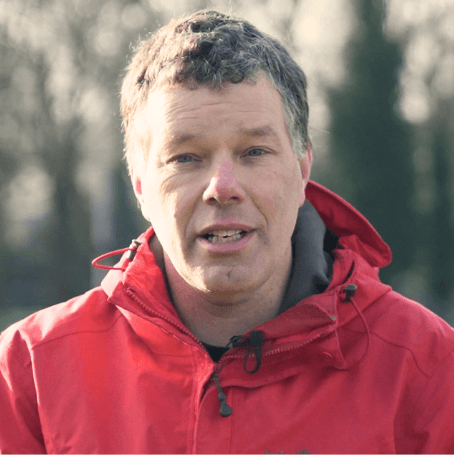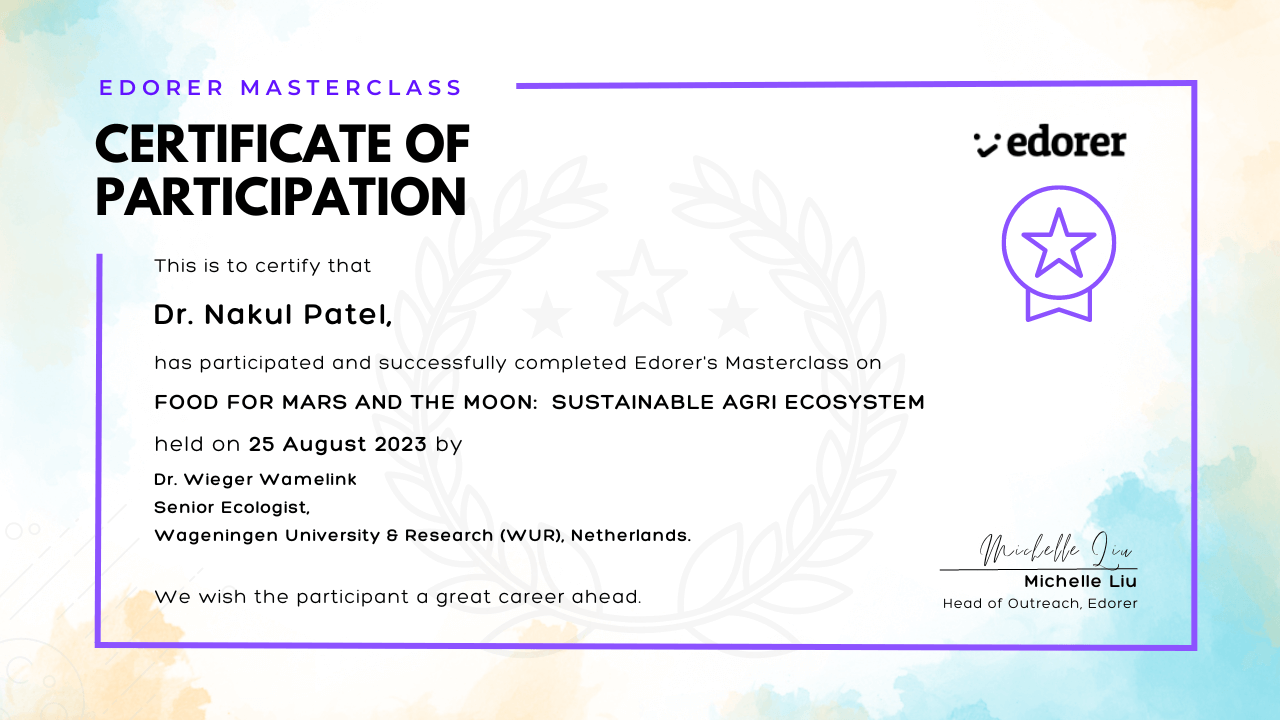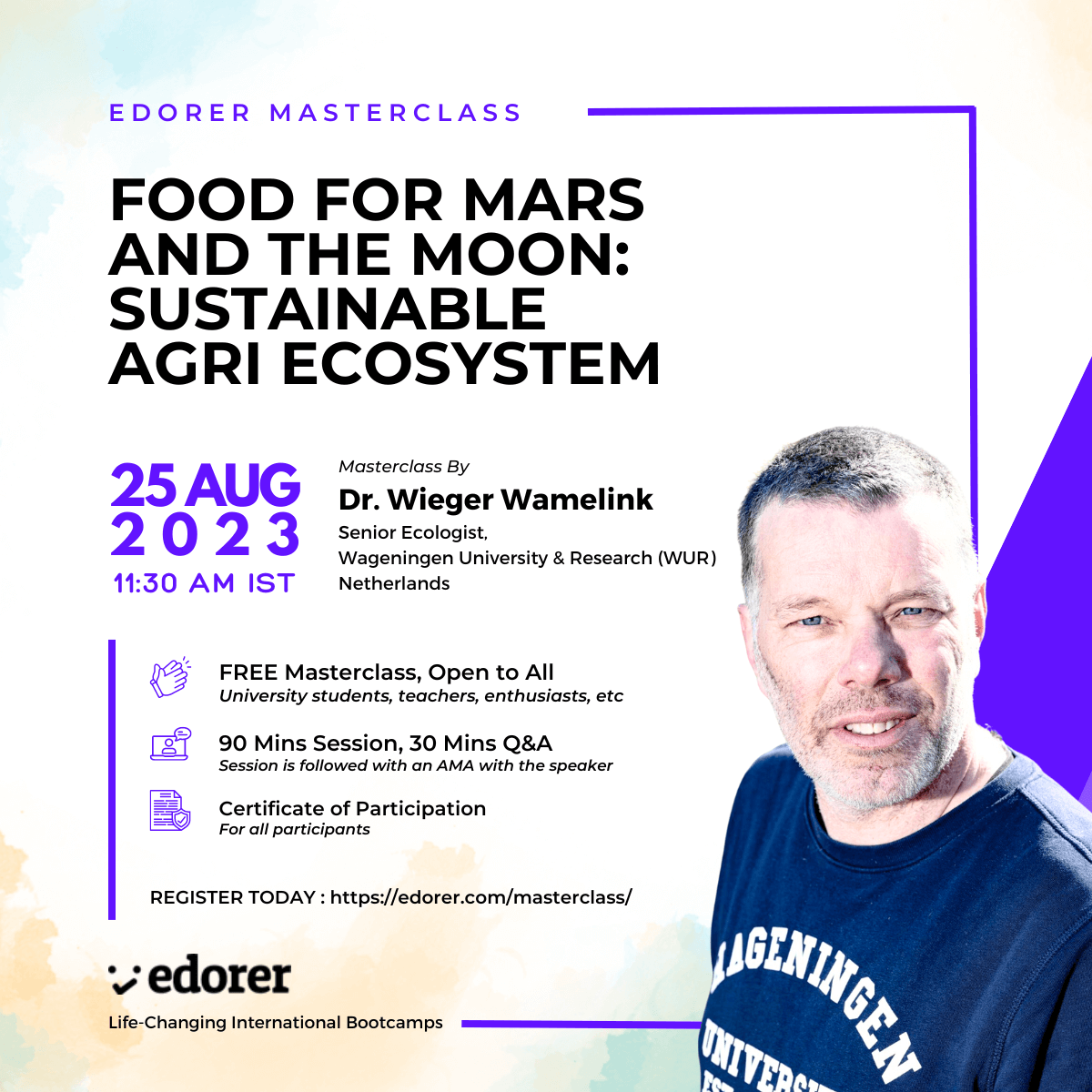EDORER MASTERCLASS > FOOD FOR MARS AND THE MOON: SUSTAINABLE AGRI ECOSYSTEM
FOOD FOR MARS AND THE MOON: SUSTAINABLE AGRI ECOSYSTEM
25 August 2023, 11:30 AM IST
Where
Online
Masterclass by
Dr. Wieger Wamelink
Senior Ecologist
Wageningen University & Research (WUR)
Netherlands
What you will learn:
– Is migration to planet Mars just a daydream or a twilight of the next leap for humankind? This dream is getting closer with the fast developments in space science and the agrifood domain.
– This masterclass is for young researchers and students. It encourages them to create solutions for space farming while considering energy, health, food and sustainability topics.
– Learn about sustainable agricultural ecosystem for Mars and the Moon, with an outlook to Earth. Get answers to the following questions:
- Can we produce food on Mars and the Moon?
- What do we need?
- How could this work?
- Where to begin?
– After this eye opening session young generation will work together for our future food production.
– This is a masterclass that no agri student or teacher can afford to miss.
FREE Masterclass, Open to All
University students, teachers, enthusiasts, etc
90 Mins Session, 30 Mins Q&A
Session is followed with an AMA with the speaker
Certificate of Participation
For all participants
About the Speaker

Dr. Wieger Wamelink works as ecologist at Wageningen University & Research (WUR) in the Netherlands. As senior researcher he works on the effects of nitrogen deposition and climate change on biodiversity, especially on plant species. He is also one of the caretakers of the nature gardens on the Wageningen campus and as campus ecologist responsible for the management of the green areas on the campus. In 2013 Wieger started Food For Mars and Moon (FFMM) with as goal to grow crops on Mars and the moon applying the regoliths and ice present at the moon and Mars. The research includes the effects of heavy metals present in the regoliths on the growth, effect of cosmic radiation on the plant growth, the application of human faeces as manure and the need to bring worms, bacteria and pollinators to create a sustainable closed agricultural ecosystem. The research recently expanded to grow mealworms on crops grown on Mars regolith simulant as an addition to astronaut’s meals and to circulate plant waste. To boldly grow where no plant has grown before.
Sample Certificate of Participation
FOOD FOR MARS AND THE MOON: SUSTAINABLE AGRI ECOSYSTEM
25 August 2023, 11:30 AM IST
Masterclass by
Dr. Wieger Wamelink
Senior Ecologist
Wageningen University & Research (WUR)
Netherlands
What you will learn:
– Is migration to planet Mars just a daydream or a twilight of the next leap for humankind? This dream is getting closer with the fast developments in space science and the agrifood domain.
– This masterclass is for young researchers and students. It encourages them to create solutions for space farming while considering energy, health, food and sustainability topics.
– Learn about sustainable agricultural ecosystem for Mars and the Moon, with an outlook to Earth. Get answers to the following questions:
- Can we produce food on Mars and the Moon?
- What do we need?
- How could this work?
- Where to begin?
– After this eye opening session young generation will work together for our future food production.
– This is a masterclass that no agri student or teacher can afford to miss.
FREE Masterclass, Open to All
University students, teachers, enthusiasts, etc
90 Mins Session, 30 Mins Q&A
Session is followed with an AMA with the speaker
Certificate of Participation
For all participants
About the Speaker

Dr. Wieger Wamelink works as ecologist at Wageningen University & Research (WUR) in the Netherlands. As senior researcher he works on the effects of nitrogen deposition and climate change on biodiversity, especially on plant species. He is also one of the caretakers of the nature gardens on the Wageningen campus and as campus ecologist responsible for the management of the green areas on the campus. In 2013 Wieger started Food For Mars and Moon (FFMM) with as goal to grow crops on Mars and the moon applying the regoliths and ice present at the moon and Mars. The research includes the effects of heavy metals present in the regoliths on the growth, effect of cosmic radiation on the plant growth, the application of human faeces as manure and the need to bring worms, bacteria and pollinators to create a sustainable closed agricultural ecosystem. The research recently expanded to grow mealworms on crops grown on Mars regolith simulant as an addition to astronaut’s meals and to circulate plant waste. To boldly grow where no plant has grown before.
Sample Certificate of Participation
Edorer Masterclasses
UPCOMING MASTERCLASSES


